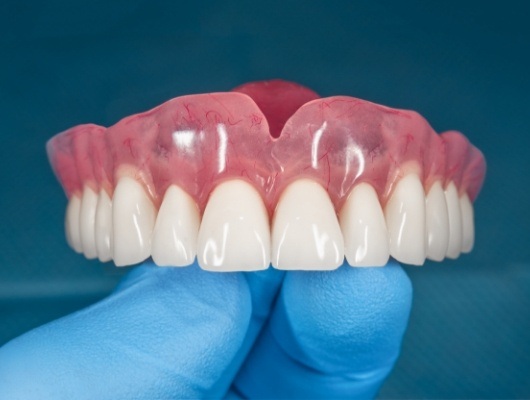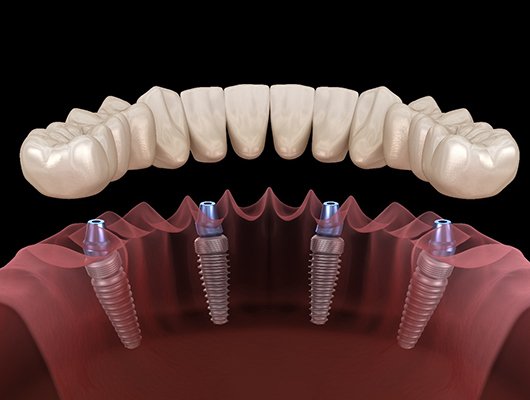Dentures – Denton, TX
Restore Your Grin to Its Whole Health Again

Dentures have been completing patients’ smiles for centuries. Evidence shows that the first use of dentures dates back to Ancient Egyptian times. Luckily for you, dentures have come a long way since our ancestors used them. While other replacement methods provide an alternative to dentures in Denton, they are still preferred by patients who want a faster, easier, and less invasive solution to replace their teeth. Keep reading to discover the amazing benefits that dentures from Prime Dentistry will bring your smile.
Why Choose Prime Dentistry for Dentures?
- Dentures Designed to Match Patients’ Smiles
- State-of-the-Art Dental Technology Used
- We Take the Time to Explain Processes to Patients
Who Is a Good Candidate for Dentures?

Almost anyone who has suffered extensive tooth loss may be able to benefit from dentures. When you visit us for a consultation, we will carefully evaluate your oral health and talk to you about your goals for treatment before we recommend your next steps. If you are not a candidate for dentures right away, you may become one after some restorative treatments. Our goal is to help you enjoy a complete and functional smile as efficiently as possible!
Read MoreEffects of Missing Teeth

Dentures may be perfect for you if you are struggling with the consequences of missing dentition. For example, you might find it difficult to eat a varied diet. As a result, you may not be getting all of the nutrients your body needs to function optimally. You might also find it embarrassing to smile or speak in public; some people with missing teeth feel isolated and lonely. Additionally, you could look older than you really are because missing teeth can cause the cheeks to have a sunken, hollow appearance.
Fortunately, dentures are often able to help patients overcome all of those issues.
What Qualifies You for Dentures?

Dentures might be right for you if:
- You have lost all or most of your teeth. If you are only missing one or two teeth, we might recommend a different type of tooth replacement.
- Your gums and jawbone are healthy. Your oral tissues should be healthy enough to support your new prosthetic. If necessary, we can perform gum disease therapy or other treatments to prepare your mouth for dentures.
- You are looking for a cost-effective form of tooth replacement. Traditional dentures are affordable for most patients.
Alternative Tooth Replacement Options

If dentures are not a fit for your circumstances, you may be eligible for another form of tooth replacement, such as:
- A dental bridge. A traditional dental bridge relies on your remaining natural teeth for support. It is a permanently fixed prosthesis that is cost-effective, sturdy, and long-lasting.
- Dental implants. Dental implants act as prosthetic tooth roots. They can support crowns, bridges, and dentures in order to replace any number of missing teeth. Because they get surgically placed in the jawbone, they can help to keep it strong and whole. Therefore, they are often held up as the gold standard of tooth replacement options.
Learn More About Dental Bridges
Learn More About Dental Implants
What Are Dentures?

Dentures today are better than ever before. Using an impression of your upper and lower gums, Dr. Ahir will create a denture mold that accounts for every little bump and ridge in your mouth. Dentures are composed of gum-colored bases, which are attached to sets of false teeth. They rest on top of your gums using suction or clasps to stay in place. Most dentures are made out of flexible resins that provide you with comfort and function. The best part is that they are completely removable, which makes cleaning incredibly easy.
Your Options for Dentures

You have three amazing options for your dentures:
Read MorePARTIAL DENTURES

Partial dentures are optimal for patients who are missing multiple teeth in the same arch of their mouth. A major benefit of partial dentures is that they maintain your remaining natural tooth structure. Typically, a partial denture is built around your remaining teeth and held in place using clasps to complete your smile. Even though they rely on supportive mechanisms, partials are still removable.
FULL DENTURES

Full dentures are the quickest and most effective way to replace an entire arch of teeth. They rest on top of your gums, staying in place with natural suction. You can even use a little denture adhesive to keep them in place, but they should be removed each night for cleaning.
IMPLANT DENTURES

If you’re looking for maximum security, implant dentures are your best option. Dental implants are tiny titanium posts that get placed directly in the jawbone to support and stabilize your dentures. Dental implants also prevent the deterioration of your jawbone, which is caused by missing teeth. Once your implants are in place, you can simply click your dentures in and out of your mouth for the most secure and functional restoration.
The Benefits of Dentures

As you may know, missing multiple teeth can make life difficult. Without all your pearly whites, you’ll likely struggle to eat, speak, and even smile confidently. Thankfully, dentures are a life-changing restoration that can drastically improve everyday living. By filling the gaps in your smile, they offer many benefits for patients who choose to get them. If you’d like to learn more about these perks, just keep reading or call our office for details.
Read MorePSYCHOLOGICAL BENEFITS

For many people, the most immediate response to tooth loss is a low mood. After all, a broken smile’s look can reduce your self-esteem, leading to sadness and depression. From there, it’s easy to retreat from social activity due to diminished confidence and insecurity.
Dentures, fortunately, solve these psychological issues. By restoring your smile’s appearance and function, the prosthetics will boost your self-confidence. You won’t have to worry about engaging with friends or family — dentures make your smile look as good as ever.
CLEARER ENUNCIATION

When you lack some of your teeth, it’s more difficult to speak. That’s only natural, as you need all your pearly whites to pronounce words correctly. If your tongue can’t touch the right ones, you’ll end up with a lisp or worse.
It’s a good thing, then, that dentures act as replacement teeth. In doing so, they allow you to enunciate more clearly than you could otherwise. All it takes is a short adjustment period, and you’ll be ready to speak naturally and effectively.
IMPROVES NUTRITION

When you lose teeth, you may need to alter your diet. Many nutritious foods, including veggies, fruits, and proteins, have tough textures that can only be chewed with a full smile. Therefore, missing pearly whites could lead you to eat poor meals that cause indigestion or malnutrition.
Things change, however, when you have dentures. These prosthetics improve your chewing ability, thus allowing you to eat a wider array of healthy foods. In other words, dentures help you get the nutrients you need for optimal overall health.
PRESERVES ORAL HEALTH

When your mouth lacks teeth, even the remaining ones are affected. In particular, your molars will start to wear from having more pressure placed on them.
Luckily, dentures bear some of the weight of regular chewing. The result is that they can reduce the wear and tear on your natural teeth.
EXPANDS OPPORTUNITIES

For better or worse, your smile is one of the first things people notice about you. As a result, its appearance can affect things like job prospects, casual relationships, and more. Therefore, you’re likely to face challenges in these areas if you lack some of your teeth.
Needless to say, dentures solve even this problem. They’re lifelike and natural-looking enough to put both friends and coworkers at ease. Consequently, you can count on them to improve your personal and professional lives.
Understanding the Cost of Dentures

The cost of dentures can vary because every case is different. How much you end up paying will depend in part on how many teeth you’re missing and the overall condition of your mouth. Dr. Ahir accepts a variety of dental insurance plans to provide you with quality dentures at an affordable price. To learn more about the factors that influence the cost of dentures in Denton, keep reading below.
Read MoreFACTORS THAT AFFECT THE COST OF DENTURES

Three major factors affect the cost of dentures:
- The preparation before the denture can be worn, which may include tooth extractions, treating gum disease, etc.
- The type of acrylic used for the gum-colored base.
- The material (usually acrylic or porcelain) used to craft lifelike and sturdy replacement teeth.
It’s important to keep in mind that cheaper does not always mean better when it comes to dental restorations. Low-cost dentures made from subpar material are more likely to break easily and less likely to fit comfortably in your mouth. You get what you pay for, so why not invest in high-quality dentures that will look and feel great?
ARE IMPLANT DENTURES MORE EXPENSIVE?
Yes, implant dentures in Denton are more expensive than traditional ones, but for good reason. While traditional dentures rest on top of your gums, implant dentures are anchored in the jawbone. By replacing your missing teeth from the roots up, implant dentures restore nearly full chewing power, never slip or shift, and look more like natural teeth. In addition, implant dentures can last much longer than traditional ones. With proper care, you can expect implant dentures to last for 30 years or even the rest of your life! Traditional dentures, on the other hand, typically need to be replaced every 5 to 7 years. Implant dentures’ unique benefits and long-lasting nature make them a wise, long-term investment.
DOES DENTAL INSURANCE COVER DENTURES?
You can likely count on your dental insurance to reduce your out-of-pocket costs for dentures. While every plan is different, most insurance providers consider dentures to be a major procedure and generally cover around 50% of their cost. Before you commit to dentures, be sure to check with your insurance company to confirm your coverage. Our knowledgeable team will be happy to assist you in understanding and maximizing your dental insurance benefits.
OTHER OPTIONS FOR MAKING DENTURES AFFORDABLE
Don’t have dental insurance? There’s no need to worry! There are other ways to ensure dentures fit within your budget. For example, qualified patients can now spread out the cost of dentures by signing up for CareCredit, a trusted dental financing organization. With CareCredit’s low-to-no-interest payment plans, you can break down the cost of dentures into manageable monthly payments. Ask our staff for more details!
Dentures Aftercare

Taking care of your dentures in Denton is crucial if you want them to last as long as possible. These prosthetics are not designed to remain fully intact forever; however, there are things you can do to ensure their longevity. As you enjoy your new teeth, you’ll want to make every effort to keep your smile looking and feeling its best, so consider these helpful tips to minimize any possible damage or decrease in their lifespan.
Read MoreRemovable Dentures

Remove After Eating
Now that you can eat many of your favorite foods, you’ll need to make sure that you remove your dentures after every meal and give them a thorough rinsing. This will ensure that you do not experience an accumulation of bacteria and food debris that can spread beneath your teeth and irritate your gum tissues.
When rinsing your mouth after eating, do not use hot water, as this can warp the material and make your dentures uncomfortable and ill-fitting.
Clean Your Restoration
Apart from rinsing your dentures after eating, you’ll also want to make sure they are thoroughly cleaned at least once each day. While your teeth are artificial and cannot decay, they still need to be cleared of any debris that can cause stains or irritation to your gums.
After removing them, you’ll want to use a soft-bristled toothbrush and clear soap to remove any particles from your teeth. It’s best to not use regular toothpaste, as this can be too abrasive, causing damage to your prosthetic.
Keep Your Dentures Safe
Dentures are capable of withstanding daily wear and tear; however, they’re not indestructible. They must be cared for properly to avoid accidental damage. This means placing a towel in the basin of your sink so that they do not break if they accidentally fall out of your hands. Also, make sure to keep them out of reach of any pets or small children.
Remove Dentures When You Sleep
You may prefer to sleep with your dentures in, but you’ll want to make sure that you take them out before going to bed at night, allowing them to soak in a denture cleaner. This will not only ensure that they are free of bad bacteria, but it will give your gums and jawbone a chance to rest.
Wearing your dentures 24/7 is not a good idea because your gums need time to receive valuable nutrients that they miss throughout the day. Allowing them to breathe at night ensures better circulation. Not to mention, the continued wear of your dentures throughout the night will increase your risk of pneumonia.
Notice Changes
When wearing your dentures, there is a good chance that they will begin to fit differently over time. This is the result of changes to your jawbone. When this happens, you’ll want to get in to see our dental team as soon as possible. Forgoing treatment will only cause further irritation to your gum tissues, whereas your dentist can provide a relinement or replacement so that your new teeth fit better day after day.
All-On-4 Dentures

If you are living with All-On-4 dentures, you’ll need to make sure that you brush your teeth twice daily with a soft-bristled toothbrush and non-abrasive toothpaste as well as floss at least once to remove any debris from between your teeth. You’ll also want to make sure that you are cleaning the areas between your prosthetic and gums so that no harmful bacteria can accumulate. Finally, make sure to rinse your mouth thoroughly with an ADA-approved mouthwash so that your teeth and gums remain healthy and refreshed.
Dentures FAQs

Are you considering dentures to replace your missing teeth and restore your smile? These classic prosthetics offer patients a way to eat and smile with complete confidence, just like they did when they had all of their natural teeth. However, you might have some questions about the treatment, especially if you’ve never worn dentures before. That’s why we’ve taken the time to answer some dentures FAQs below.
HOW OFTEN WILL I NEED TO REPLACE MY DENTURES?
Unfortunately, even the best-made dentures are simply not designed to last forever. On average, they last anywhere from 5-10 years, depending on how well you take care of them. The reason that dentures don’t last long is that your jawbone and facial muscles change shape over time due to the fact that you’re missing the root of your natural teeth. To remedy this problem, you can get your dentures adjusted and relined, but eventually, the change will be so great that you’ll need entirely new prosthetics.
HOW OFTEN WILL I NEED TO SEE MY DENTIST?
It’s a common myth that once you’re missing all your teeth and get them replaced with dentures, you no longer have to attend regular dental checkups. This is definitely NOT true. You’ll still need to see Dr. Ahir at least once every six months for X-rays and checkups to see how your dentures are fitting, how your gums are faring, and whether you have any signs of health problems like oral cancer.
CAN I SLEEP IN MY DENTURES?
While it’s certainly possible to sleep in your dentures, we wouldn’t recommend it. Removing them at night gives your gums and jawbone an opportunity to rest from the pressure of holding your dentures in place all day. Additionally, you shouldn’t wear your dentures for a full 24 hours without cleaning them, so the night is the perfect chance to do so. Soaking your teeth overnight can remove built-up food particles and prevent plaque from accumulating on them or in your mouth.
HOW DO I KNOW IF IT’S TIME TO RELINE MY DENTURES?
As long as you keep up with your regular checkups and cleanings, we should be more than able to tell when your dentures need an adjustment. When a change occurs in your jaw, you will notice that your dentures no longer sit correctly within your mouth. As a result, you’ll need to schedule an appointment with us so that we can refit the base. This creates a tighter fit, increasing your comfort and decreasing the chance that your dentures will come loose or fall out during your daily life.





New Patient 1st Visit
Second Opinions

